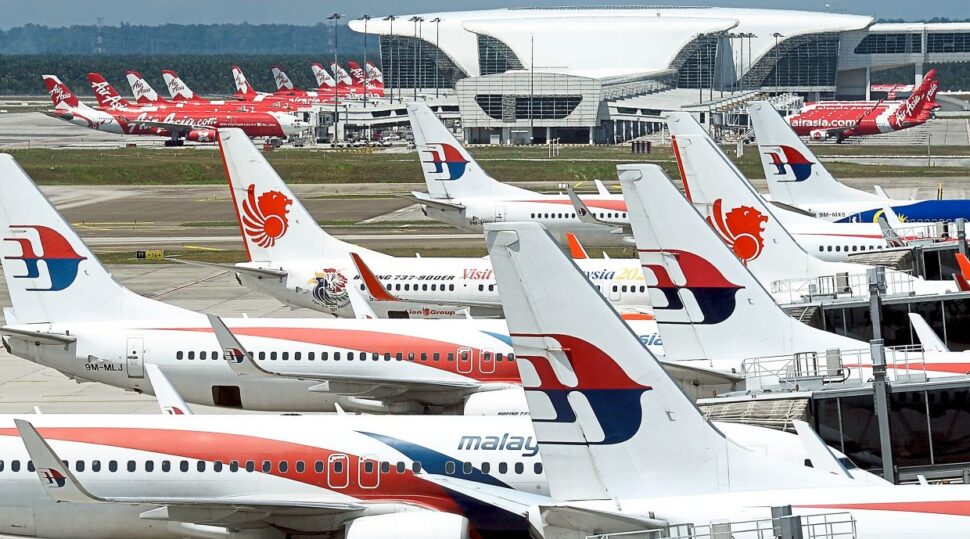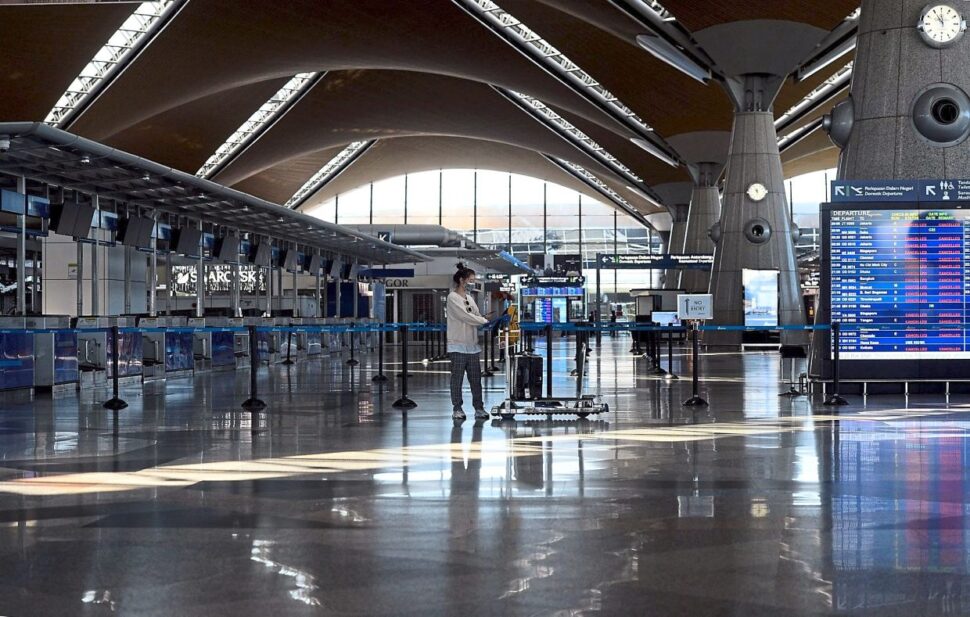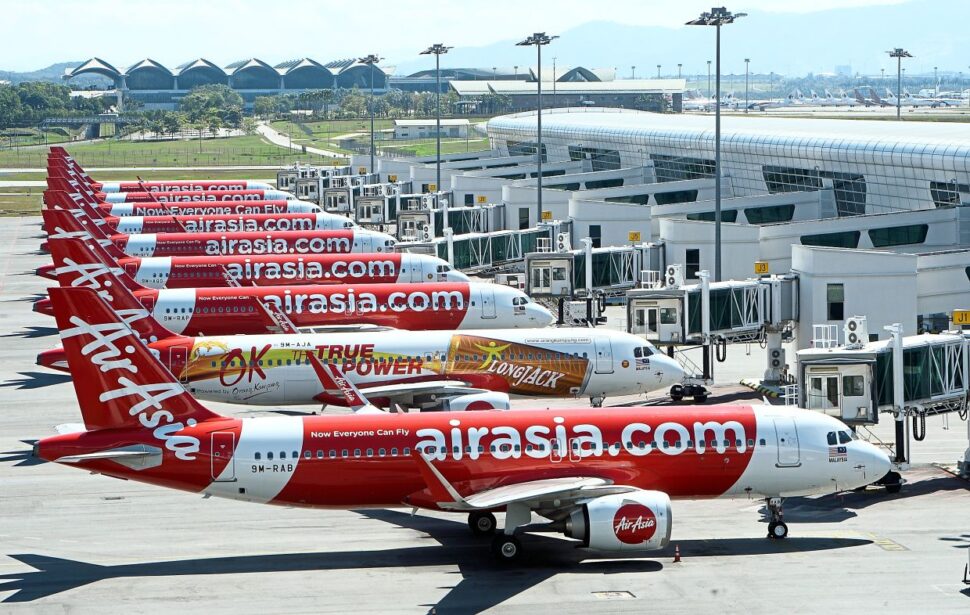2 April 2020
All around the world, airlines are forced to deal with the devastating effects of the ongoing global outbreak of Covid-19 which have effectively brought the travel industry to a standstill.

As more countries close off their borders and restrict travel to minimise the spread of the novel coronavirus, many carriers are either reducing their network operations or temporarily grounding their aircraft.
Visitors to airports in Malaysia, such as the Kuala Lumpur International Airport (KLIA) and KLIA2, are now greeted by the extremely rare sight of aprons (tarmac) being occupied by dozens of grounded aircraft.
The Malaysian Aviation Commission (Mavcom) said air travel in the country is predicted to decrease significantly due to the global outbreak of Covid-19.
A revised estimate by the commission shows passenger traffic this year to be between 67.7 million and 69.7 million passengers, a considerable decrease from last year’s all-time high of 109.2 million passengers.
Mavcom executive chairman Dr Nungsari Ahmad Radhi said the aviation sector is facing a huge blow during the crisis.
“Aviation is perhaps the worst hit (in the industry) by the global Covid-19 outbreak as travel has almost stopped, forcing airlines to be essentially grounded, thereby putting them in serious financial distress, ” he said.
Figures from Mavcom showed that existing flight cancellations by both Malaysian and foreign carriers totalled 14 million seats for the period between January and December 2020.

Malaysian carriers are continuously reducing seat capacity in 2020 in response to low air travel demand and travel restrictions imposed by countries worldwide.
As of March 26,7.3 million seats have already been cancelled, representing 8.6% of total seat capacity for Malaysian carriers this year.
Meanwhile, foreign carriers operating to and from Malaysia have also reduced seat capacity by 6.7 million (24.5% of total seat capacity for foreign carriers).
“The airlines’ survival – indeed, the landscape of domestic and global aviation industry when the crisis is over – are matters that are still unfolding, ” said Nungsari.
He added that Malaysia needs an aviation sector that supports its economic growth as well as passenger demand for travel.
“A major crisis such as this calls for radical solutions including further consolidation and liberalisation, keeping in mind the national imperatives for the industry, safeguarding competition and consumer interests, and practising good governance, ” Nungsari explained.
Mavcom is also urging the government to consider relaxing ownership rules for airlines to allow easier sourcing of funds from domestic and international capital markets.
“The industry welcomes help from the government, in any appropriate form, but we are mindful of the demand for public resources in a time like this, ” said Nungsari.
On hibernation
AirAsia Group has announced the temporary hibernation of its fleet across the network. For AirAsia Malaysia, this translates to suspension of all international and domestic flights from March 28 to April 21.
“With governments imposing travel and movement restrictions including home quarantine orders, AirAsia is also playing its part in helping curb the spread of the virus in order to keep flying safe for everyone, ” the company said in a statement.
All affected guests whose flights have been cancelled are being immediately notified by email and SMS, with refund options outlined.
“We will continue to evaluate the situation closely and we are prepared to reinstate our services as soon as the situation improves, subject to the necessary regulatory approvals.
“We believe this temporary fleet hibernation is the right thing to do to ensure the well-being of our guests and employees, which will remain as the top priority of our business during this challenging time, ” the airline said.

In an effort to manage and contain costs, AirAsia also revealed that both its management and senior employees have volunteered a pay cut, ranging from 100% at the very top to 15%.
“This will help ensure that we can ride out this prolonged period of extremely low travel demand and at the same time minimise the impact on our employees, especially those in junior positions, ” said AirAsia, adding that the airline is committed to assisting the relevant government authorities and agencies for repatriation of travellers and shipment of goods.
Bringing travellers home
Earlier, Malaysia Airlines, too, announced that it is scaling back operations in light of the global travel restrictions and the movement control order (MCO) in Malaysia.
More recently, the national carrier said it is reinstating some of its international flights between April and May to bring home those who have been stranded abroad due to travel restrictions in many parts of the world.
Malaysia Airlines group chief executive officer Captain Izham Ismail said there have been many requests from those asking for assistance to fly home family members and friends.
“Many customers from Malaysians to foreigners have reached out to our global offices requesting for available flights mostly between Kuala Lumpur and Australia and New Zealand, as well as to Kuala Lumpur onward to London, ” he said.
Since the MCO, Malaysia Airlines has reduced its domestic frequencies and schedules. It is currently running at a minimum – mostly to facilitate essential travels and cargo movement.
“Recently we transported two tonnes of face masks and personal protection equipment (PPE) from Kuala Lumpur to Kota Kinabalu, as well as 300,000 pieces of disposable masks, 50,000 pieces of PPE and 8,000 pieces of PPE with eye mask, courtesy of the Jack Ma Foundation and Alibaba Foundation from Shanghai to Kuala Lumpur, ” said Izham.
In the next few days, MABkargo will be flying in more than 10 million pieces of masks and ventilators from Shanghai and Guangzhou.
Malaysia Airlines, Firefly and MASwings are facilitating movement of goods as well as medical staff across Peninsular Malaysia and within Sabah and Sarawak.
The three airlines have also positioned standby aircraft at Subang Airport (Selangor), KLIA and Kota Kinabalu International Airport to mobilise medical staff and professionals as well as other (non-Covid-19) patients to support the Health Ministry’s capacity and resource management efforts across the country.
Source: thestar.com.my
Site Search
Did you find what you are looking for? Try out the enhanced Google Search: